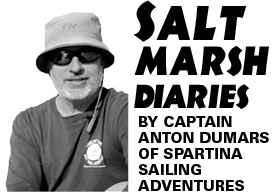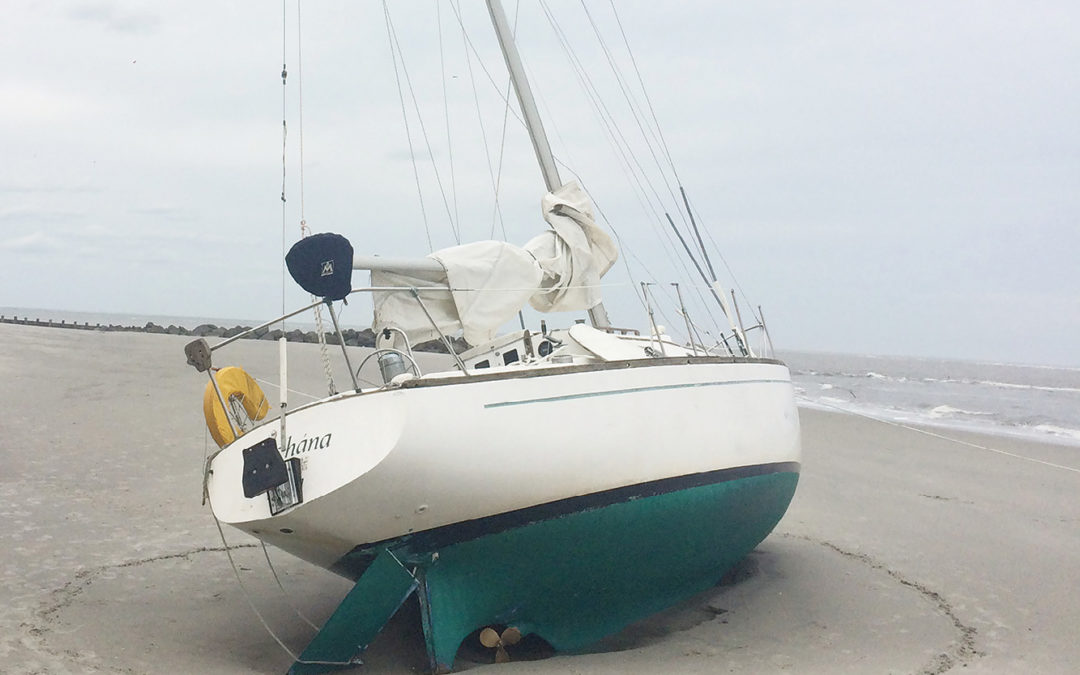 John awoke abruptly to the sound of fiberglass splintering against granite as his boat pounded across the rock groin. Soon he and his 32-foot sailboat washed ashore.
John awoke abruptly to the sound of fiberglass splintering against granite as his boat pounded across the rock groin. Soon he and his 32-foot sailboat washed ashore.
A friend messaged, wondering if my boat had washed up on the beach. Standing in Spartina’s main salon, I texted back “nope.” Boats don’t often wash ashore on Folly, so I drove from one end of the island to the other to take a look. There, heeled over on its port side, half way up a low-tide beach lay a medium-size cruising sailboat.
As I approached, I couldn’t see anyone aboard. I walked around the boat for a visual survey. The rudder lay askew to port, broken off its lower gudgeon. The prop shaft was bent to starboard. The vessel’s barnacle-free propeller and bottom indicated this wasn’t some forgotten derelict adrift. I was soon joined by a group of British beachcombers who were visiting from Southampton. “Quite tragic,” one quipped.
About then, I heard a voice from behind say “We’ve been here a week now.” I turned to see a bearded guy wearing a wide-brimmed hat and green photographer’s vest. He walked up and stood beside us. “Your boat?” I asked. “Were you anchored?”
“Yes … out there.” He gestured toward the ocean. “My anchor didn’t hold … I’m John.”
No one anchors in the ocean, I thought to myself. Shrimpers do, but usually not solo sailors. “Did your engine not start?”
“I didn’t know I was dragging anchor until I hit the rocks” he answered.
“You have a place to stay? You need food or somewhere to do your laundry?”
“Oh, I’m staying on board!” John said protectively. “My stern light already got stolen. Provisions are running a little low, though. Mostly, I need help getting this boat off the beach and I don’t know anyone here to help me.”
The vessel weighed almost 12,000 pounds. This won’t end well, I thought.
Having left Boston in September, John hoped to get south before winter. The vessel’s inboard diesel engine failed in the Cape Cod Canal, so he mounted an outboard on the transom for temporary propulsion. In Oriental, N.C. a new diesel inboard was installed.
The City and others stepped in to offer help where they could, but no one seemed able to re-float John’s dream. As I saw it, there was but one logical option- scrap the boat. Dragging the boat back to the water would take lots of horsepower. Once there, a sandbar stood between the beach and deep water. Even if the boat was refloated, the subsequent haul-out, rudder, and shaft repair could cost four times more than the boat’s worth.
After almost a month, the story ended, at least for what happened on Folly. The vessel left the beach on a flatbed trailer. John, the now-former owner, who didn’t drive, left for Florida as a passenger in a van.
Anton DuMars is a coastal geologist and longtime Folly resident. Come sail aboard S/V Spartina. To book a trip, visit sailspartina.com or email Capt. Anton at sailspartina@gmail.com.


